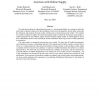Free Online Productivity Tools
i2Speak
i2Symbol
i2OCR
iTex2Img
iWeb2Print
iWeb2Shot
i2Type
iPdf2Split
iPdf2Merge
i2Bopomofo
i2Arabic
i2Style
i2Image
i2PDF
iLatex2Rtf
Sci2ools
108
click to vote
SIGECOM
2010
ACM
2010
ACM
Auctions with online supply
We study the problem of selling identical goods to n unit-demand bidders in a setting in which the total supply of goods is unknown to the mechanism. Items arrive dynamically, and the seller must make the allocation and payment decisions online with the goal of maximizing social welfare. We consider two models of unknown supply: the adversarial supply model, in which the mechanism must produce a welfare guarantee for any arbitrary supply, and the stochastic supply model, in which supply is drawn from a distribution known to the mechanism, and the mechanism need only provide a welfare guarantee in expectation. Our main result is a separation between these two models. We show that all truthful mechanisms, even randomized, achieve a diminishing fraction of the optimal social welfare (namely, no better than a Ω(log log n) approximation) in the adversarial setting. In sharp contrast, in the stochastic model, under a standard monotone hazard-rate condition, we present a truthful mechanism...
Related Content
| Added | 18 Jul 2010 |
| Updated | 18 Jul 2010 |
| Type | Conference |
| Year | 2010 |
| Where | SIGECOM |
| Authors | Moshe Babaioff, Liad Blumrosen, Aaron Roth |
Comments (0)

